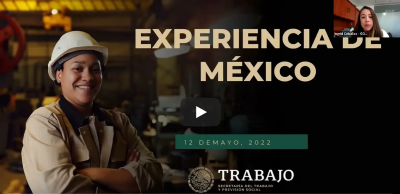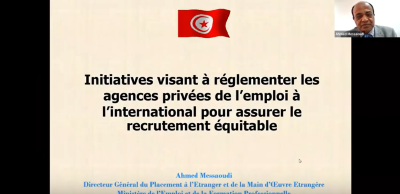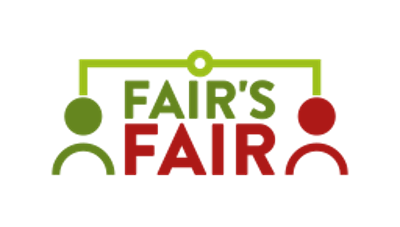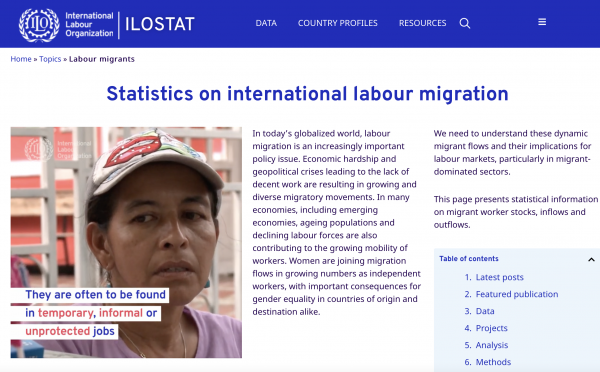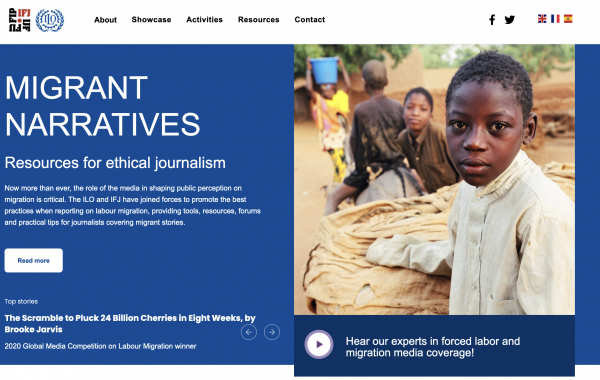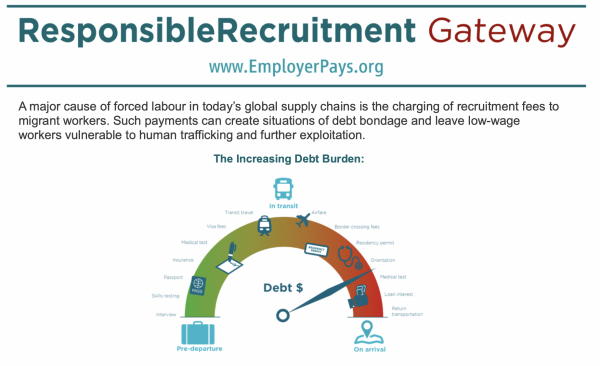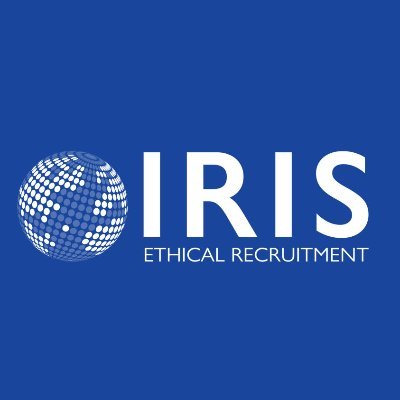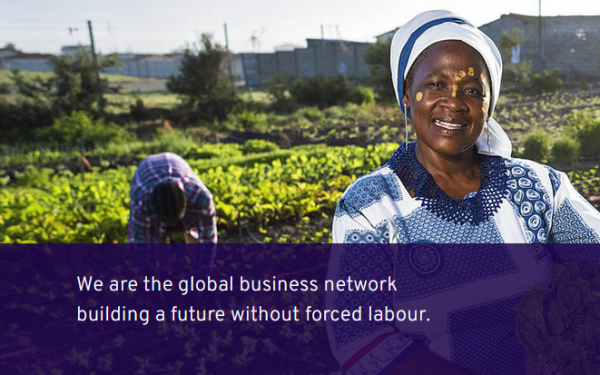Extracts of the first thematic dialogue of Alliance 8.7 Pathfinder Countries
This video presents extracts of the first thematic dialogue of Alliance 8.7 Pathfinder Countries. The online event brought together members of the Alliance to discuss how to accelerate progress towards target 8.7 of the 2030 sustainable development goals. This target seeks to eradicate forced labour, modern slavery, human trafficking, and child labour.
The thematic dialogue, held in May 2022, focused on the topic of recruitment, and what practical measures are taken by governments and social partners to promote fair recruitment in their respective countries.
In these videos we present speakers from Mexico and from Tunisia.
In the first video, we hear from Maestra Ingrid CEBALLOS, the General Director for Institutional Affairs, in the Ministry of Labour and Social Welfare of the Government of Mexico. Maestra CEBALLOS is also the co-chair ILO Fair Recruitment Initiative’s advisory committee.
We then hear from Mrs Luz Maria CHOMBO, Certification Manager for the employer’s organisation AHIFORES (International Horticultural Alliance for the Promotion of Social Responsibility).
In this video, we hear from Mr. Ahmed MESSAOUDI, Director General at the Ministry of Vocational Training and Employment; Mr. MESSAOUDI is a member of the Advisory Committee of the ILO Fair Recruitment Initiative. We then hear from Mr. Abdelkader Mhadhbi from the Tunisian General Labour Union (UGTT).
The webinar was facilitated by Ms. Laura de Franchis (ILO, Geneva), and organised by Ms. Gaëla Roudy Fraser (ILO, Geneva) as part of the implementation of the Integrated Programme on Fair Recruitment (FAIR, phase II) supported by the Swiss Agency for Development and Cooperation.
Type of document :
Country/Region : ,
Year of publication :
Theme : , , , , ,
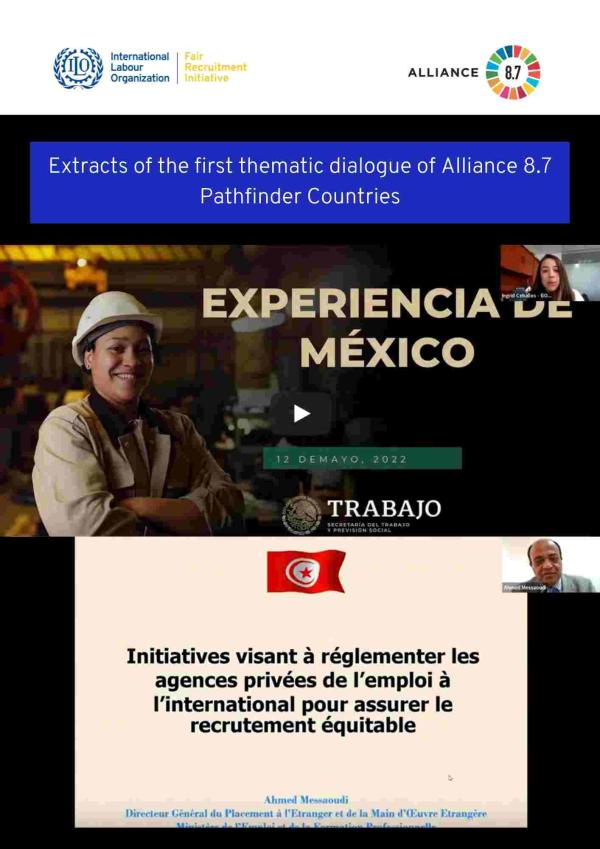
Responsible Sourcing Tool
The Responsible Sourcing Tool is the result of the collaboration of four institutions committed to fighting human trafficking: the State Department’s Office to Monitor and Combat Trafficking in Persons, Verité, Made in a Free World, and the Aspen Institute.
Type of document :
Country/Region :
Year of publication :
Theme :
Just Good Work
Just Good Work is a free interactive mobile app, giving job-seekers and workers critical information and advice for everything needed on the journey to work, from recruitment, to employment and life in a new destination, to moving on or returning home.
Type of document :
Country/Region :
Year of publication :
Theme : , , , , ,
Fair’s Fair
Fair’s Fair is an awareness and education programme to support the commercially sustainable procurement of agency labour so that workers never pay the price of poor purchasing practice.
Type of document :
Country/Region :
Year of publication :
Theme : , , ,
Ensuring Fair recruitment, what the ILO has achieved, an infostory
A recruitment process is only fair when carried out within the law and in line with the International Labour Standards, but most importantly when it respects human rights.
Building on ILO’s extensive experience in improving labour migration and preventing forced labour, the Fair Recruitment Initiative was launched in 2014 to protect workers from abuse and exploitation, while also responding to labour market needs.
As the ILO launches the second phase of the Fair Recruitment Initiative, we look at how it has reformed recruitment laws and practices around the world, and has improved workers’ lives.
Type of document :
Country/Region :
Year of publication :
Theme : , ,
ILO ILM statistics database
This page presents statistical information on migrant worker stocks, inflows and outflows.
Type of document :
Country/Region :
Year of publication :
Theme :
Migrant Narratives
The International Federation of Journalists (IFJ) and the International Labor Organization (ILO) have joined forces to launch the Migrant Narratives project, a new digital platform which provides essential resources, tips, activities and best practices for media workers reporting migrants' stories.
Type of document :
Country/Region :
Year of publication :
Theme :
Responsible Recruitment Gateway
The Responsible Recruitment Gateway is home to the Employer Pays Principle increasingly being adopted by companies across sectors and around the world.
The Gateway hosts a growing resource bank to help companies move towards an ethical recruitment.
It is also a platform for the Leadership Group for Responsible Recruitment, convened by IHRB. All members of the Leadership Group are publicly committed to the Employer Pays Principle and its implementation throughout their supply chains. The Leadership Group's aim is bold - the total eradication of fees being charged to migrant workers to secure employment
The Leadership Group acts as a vehicle for advocacy and collaboration, and serves as a knowledge hub for sharing good practice, tools, and guidance in relation to responsible recruitment. To achieve its vision of a world where no worker pays fees to secure employment, the Leadership Group seeks to catalyse leadership among an expanding membership base of companies committed to responsible recruitment.
Type of document :
Country/Region :
Year of publication :
Theme : ,
IRIS Ethical Recruitment
IRIS: Ethical Recruitment is IOM's flagship initiative to promote ethical recruitment of migrant workers. It has been created by IOM and a coalition of partners from government, civil society and the private sector. IRIS is a global multi-stakeholder initiative that supports governments, civil society, the private sector and recruiters to establish ethical recruitment as a norm in cross-border labour migration.
The goal of IRIS is to make international recruitment fair for everyone involved: migrant workers, employers, recruiters and countries of origin and destination. It does this by:
- Promoting respect for the rights of migrant workers;
- Enhancing transparency and accountability in recruitment;
- Advancing the Employer Pays Principle; and
- Strengthening public policies, regulations and enforcement mechanisms.
IRIS is referred to under Objective 6 of the Global Compact for Safe, Orderly and Regular Migration and a number of other inter-governmental frameworks.
IRIS priorities include: 1) awareness raising and capacity building, 2) migrant worker voice and empowerment, 3) the regulation of international recruitment, 4) voluntary certification of private recruitment agencies, and 5) stakeholder partnership and dialogue.
Type of document :
Country/Region :
Year of publication :
Theme : ,
ILO Global Business Network on Forced Labour
The International Labour Organization’s (ILO) Global Business Network on Forced Labour (GBNFL) brings together the ILO with businesses of all sizes and sectors, and their networks, from around the globe to eradicate forced labour. Operating across all sectors, and geographies, ILO GBNFL members work to engage smaller enterprises, develop actionable resources and tools, and devise local solutions that help shape national frameworks to create lasting change.
The challenge
In 2016 there were an estimated 25 million people in forced labour globally. Of these 16 million were thought to be women and girls and 4.3 million children. The COVID-19 crisis is likely to have worsened the situation by exacerbating root causes of forced labour, such as poverty, discrimination, and lack of access to social protection.
Forced labour is present in every region in the world. Migrant workers, estimated by the ILO to number 169 million worldwide, are among those particularly at risk of becoming victims. Businesses are serious about eradicating forced labour, as demonstrated by the extensive number of initiatives. But the task is huge and new forms of collaboration are needed.
Target 8.7 of the United Nations’ (UN) Sustainable Development Goals (SDGs), adopted by all UN Member States, aims to eradicate forced labour by 2030. To turn this vision into reality, businesses and others need a collective and inclusive approach at global and country levels that ensures lasting impact.
A global business network
ILO GBNFL is a global business network coordinated by the ILO. This UN agency brings together governments, employers and workers to set international labour standards, develop policies and devise programmes promoting decent work. The network opened for membership in 2018.
ILO GBNFL reaches across sectors and geographies to advance the business case for an end to forced labour. The network is aligned with, and contributes to, other relevant international initiatives, in particular Alliance 8.7, the global partnership working to deliver on SDG Target 8.
ILO GBNFL key focus areas
Connect - Break silos by linking up business actors from across sectors and geographies to eradicate forced labour.
Convene - Support businesses to engage with other relevant stakeholders, including government bodies, to find sustainable solutions to the structural drivers of forced labour.
Innovate - Create spaces where members identify gaps, develop new ways of tackling forced labour, and devise methods to scale up solutions.
Support - Share clear-cut data, information and resources to help busy businesses take steps to tackle forced labour.
Our Members
ILO GBNFL members are businesses of all sizes and sectors, as well as employer and business membership organizations including industry trade groups and sectoral associations. Other business-led initiatives with complementary mandates and expertise can join as partners. By joining the ILO GBNFL members are called on to:
Eradicate. Take concrete steps to eradicate forced labour in all its forms in their organizations, supply chains, member organizations, sectors and beyond.
Advocate for a comprehensive and coordinated response to forced labour, including in dealings with government bodies
Uphold the principles of inclusivity and collaboration when working with other stakeholders to end forced labour.
Type of document :
Country/Region :
Year of publication :
Theme :
Subscribe to the Fair Recruitment Initiative Newsletter
Sign up to receive news delivered to your inbox.

